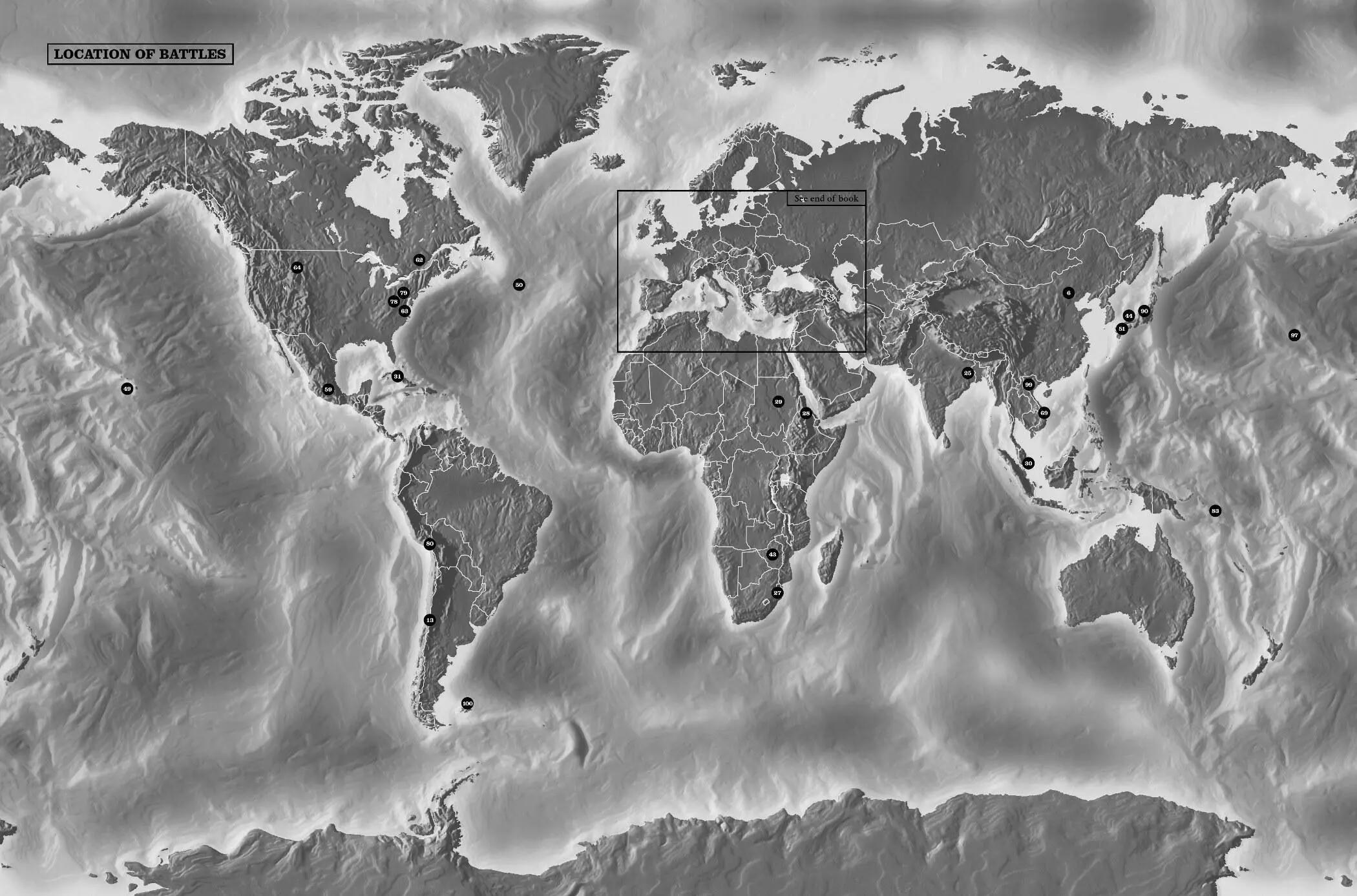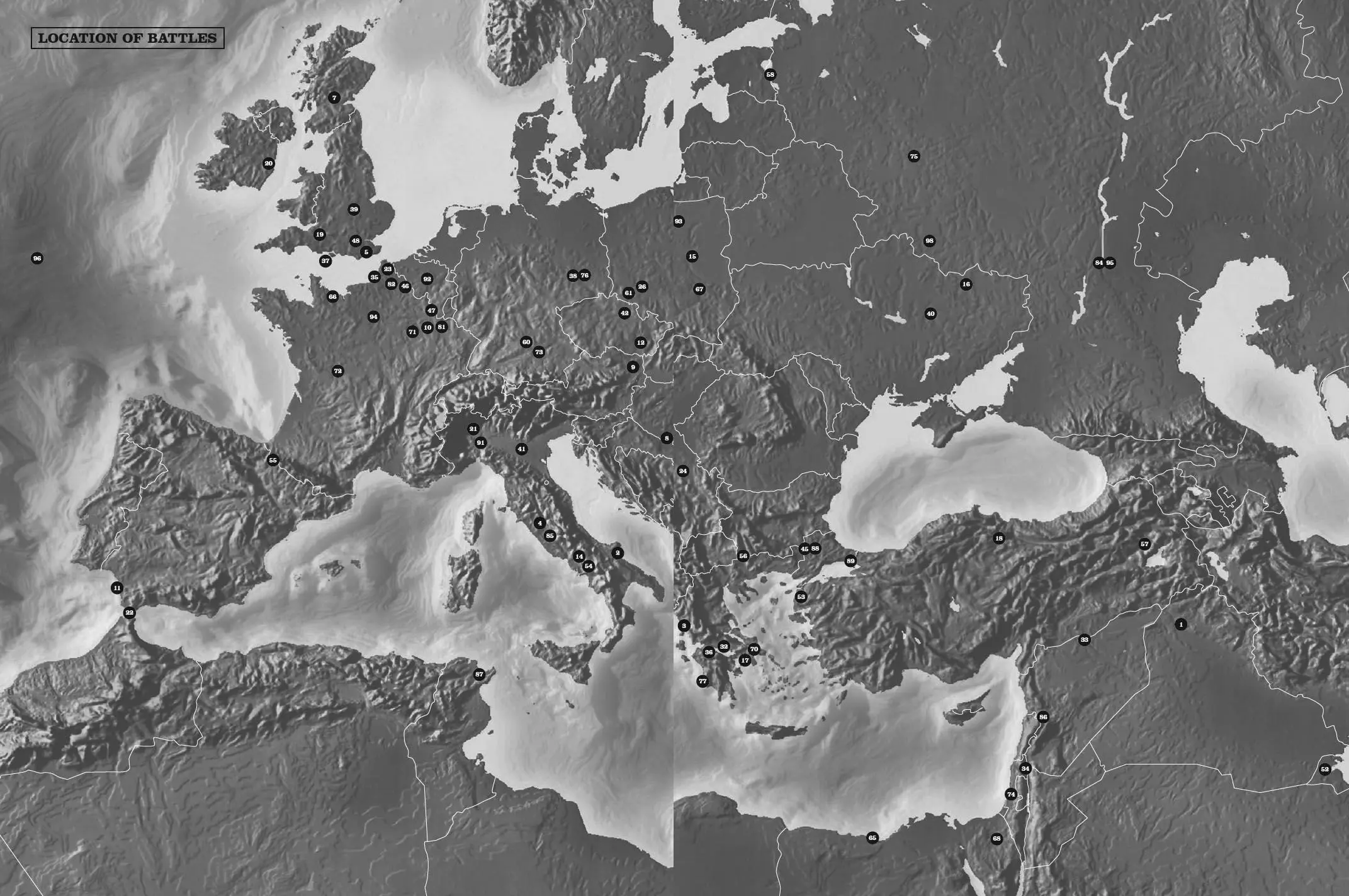
William Collins
An imprint of HarperCollinsPublishers
1 London Bridge Street
London SE1 9GF
www.WilliamCollinsBooks.com
First published in Great Britain as A History of War in 100 Battles by William Collins in 2014
This Ebook edition published 2016
Text © Richard Overy 2014
Richard Overy asserts the moral right to be identified as the author of this work
A catalogue record of this book is available from the British Library
Cover photograph © Getty Images
All rights reserved under International and Pan-American Copyright Conventions. By payment of the required fees, you have been granted the non-exclusive, non-transferable right to access and read the text of this e-book on screen. No part of this text may be reproduced, transmitted, down-loaded, decompiled, reverse engineered, or stored in or introduced into any information storage retrieval system, in any form or by any means, whether electronic or mechanical, now known or hereinafter invented, without the express written permission of HarperCollins.
Source ISBN: 9780007452514
Ebook Edition © September 2016 ISBN: 9780008220761
Version: 2016-09-21
Praise for Professor Richard Overy:
‘One of the great works of historical reference in the English language. If you were allowed only one history book in the whole of your life, The Times Complete History of the World would be hard to beat because it conveys a sense not only of time, but also of place’
Niall Ferguson, Professor of History, Harvard University
‘Magnificent … It is probably the most important book published on the history of the second world war this century’
Guardian
‘Monumental … this is a major contribution to one of the most controversial aspects of the Second World War … hugely impressive’
Literary Review
‘This tremendous book does what the war it describes signally failed to do. With a well-thought-out strategy and precision, it delivers maximum force on its objectives … the result is a masterpiece of the historian’s art’
The Times
‘Excellent … Overy is never less than an erudite and clear-eyed guide whose research is impeccable and whose conclusions appear sensible and convincing even when they run against the established trends’
Financial Times
‘An extraordinary and far-reaching history … Overy’s scope is incredibly broad and well-researched, also highly readable’
Spectator
Contents
Cover
Title Page
Copyright
Praise for Professor Richard Overy
Maps
Preface
Introduction: The Truth of Battle
Chapter 1: Leadership
1 Battle of Gaugamela
2 Battle of Cannae
3 Battle of Actium
4 Battle of the Milvian Bridge
5 Battle of Hastings
6 Battle of Zhongdu
7 Battle of Bannockburn
8 Battle of Mohács
9 Siege of Vienna
10 Battle of Valmy
11 Battle of Trafalgar
12 Battle of Austerlitz
13 Battle of Maipú
14 Battle of Volturno
15 Battle for Warsaw
16 Third Battle of Kharkov
Chapter 2: Against the Odds
17 Thermopylae and Salamis
18 Battle of Zela
19 Battle of Edington
20 Battle of Clontarf
21 Battle of Legnano
22 Battle of the River Salado
23 Battle of Agincourt
24 Siege of Belgrade
25 Battle of Plassey
26 Battle of Leuthen
27 Rorke’s Drift
28 Battle of Adwa
29 Battle of Omdurman
30 Fall of Singapore
31 Battle of Santa Clara
Chapter 3: Innovation
32 Battle of Leuctra
33 Battle of Carrhae
34 Battle of Ain Jalut
35 Battle of Crécy
36 Battle of Lepanto
37 The Spanish Armada
38 Battle of Breitenfeld
39 Battle of Naseby
40 Battle of Poltava
41 Battle of Solferino–San Martino
42 Battle of Königgrätz (Sadowa)
43 Battle of Shangani
44 Battle of Tsushima
45 Siege of Edirne
46 Battle of Cambrai
47 Battle of France
48 Battle of Britain
49 Pearl Harbor
50 Battle of the Atlantic
51 Hiroshima and Nagasaki
52 Operation Desert Storm
Chapter 4: Deception
53 The Fall of Troy
54 Battles of Mount Vesuvius
55 Battle of Roncesvalles
56 Battle of Kleidion–Strumitsa
57 Battle of Manzikert
58 Battle of Lake Peipus
59 Fall of Tenochtitlán
60 Battle of Blenheim
61 Battle of Hohenfriedberg
62 Battle of the Plains of Abraham
63 Siege of Yorktown
64 Battle of the Little Big Horn
65 Battle of Alam Halfa
66 The Normandy Invasion
67 Operation Bagration
68 The Six Day War
69 Tet Offensive
Chapter 5: Courage in the Face of Fire
70 Battle of Marathon
71 Battle of the Catalaunian Fields (Châlons)
72 Battle of Poitiers–Tours
73 Battle of Lechfeld
74 Battle of Arsuf
75 Battle of Borodino
76 Battle of Leipzig
77 Battle of Navarino Bay
78 First Battle of Manassas (Bull Run)
79 Battle of Gettysburg
80 Battle of Tacna
81 Battle of Verdun
82 First Day of the Somme
83 Guadalcanal
84 Stalingrad
85 Fourth Battle of Monte Cassino
Chapter 6: In the Nick of Time
86 Battle of Kadesh
87 Battle of Zama
88 Battle of Adrianople
89 Fall of Constantinople
90 Battle of Sekigahara
91 Battle of Marengo
92 Battle of Waterloo
93 Battle of Tannenberg
94 First Battle of the Marne
95 Defence of Tsaritsyn
96 Sink the Bismarck
97 Battle of Midway
98 Battle of Kursk
99 Battle of Dien Bien Phu
100 Battle for the Falklands
Picture Section
Bibliography
Index
Acknowledgements
About the Author
About the Publisher


Choosing just 100 battles from recorded human history is a challenge. Not just because it is necessary to cover a period of almost 6,000 years, but because men have fought each other almost continuously for millennia. Any century of battles has to be arbitrary. Anyone who knows anything about the history of war may be disappointed at what has had to be omitted, but each of the battles described here has something memorable about it. Between them, they tell us something about how the nature of armed combat has changed over time, and also how some things have remained the same, whatever changes in technology, organization or ideas separate one era from another.
It is an old adage that you can win a battle but lose a war. The battles featured here almost always resulted in victory for one side or another, but the victor did not necessarily win the war. Some battles are decisive in that broader historical sense, others are not. The further back in time we go, the more likely it is that an enemy could be finished off in one blow. The wars of the modern age, between major states, involved repeated battles until one side was battered into submission. Some of the great generals of the recent past – Napoleon, Robert E. Lee, Erich von Manstein – were on the losing side but are remembered nonetheless for their generalship. Some on the winning side have all but disappeared from the history books or from public memory.
Читать дальше
















